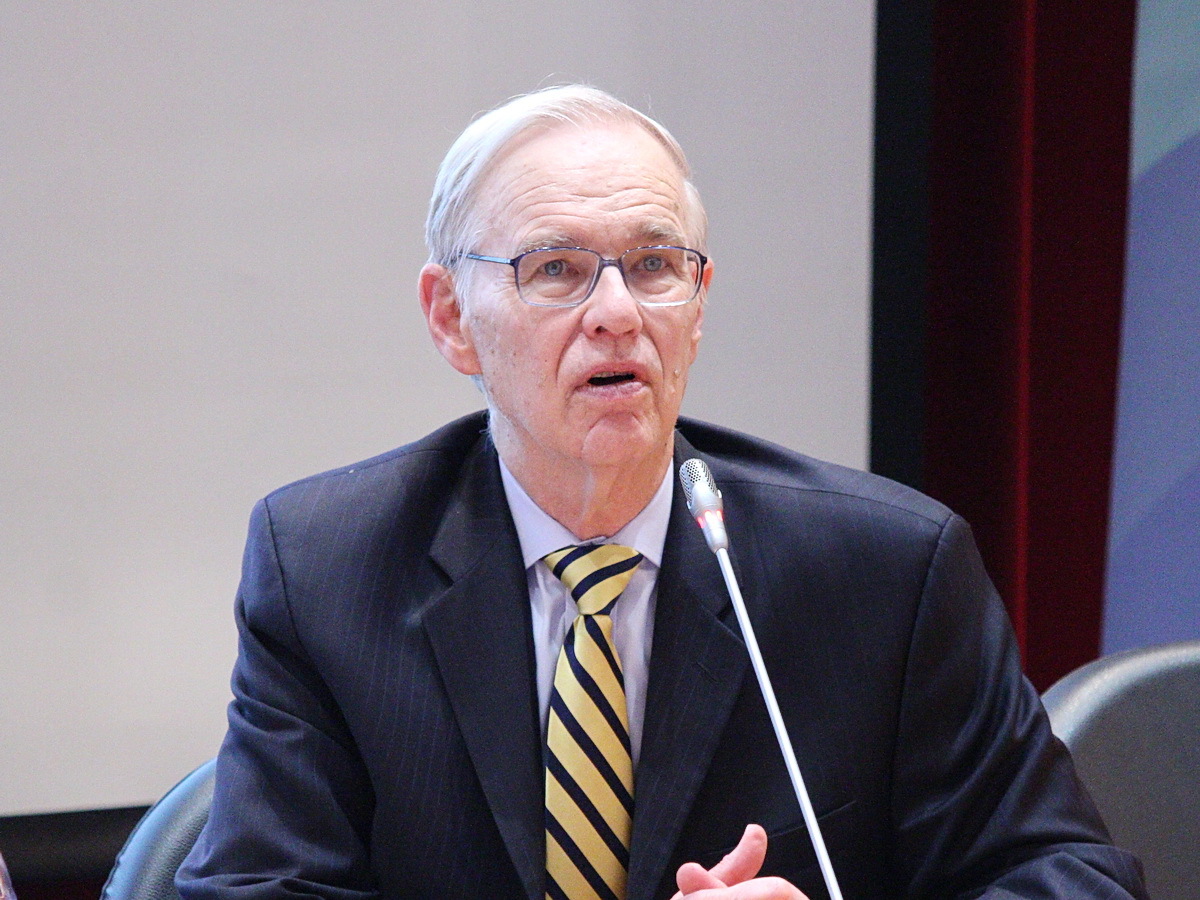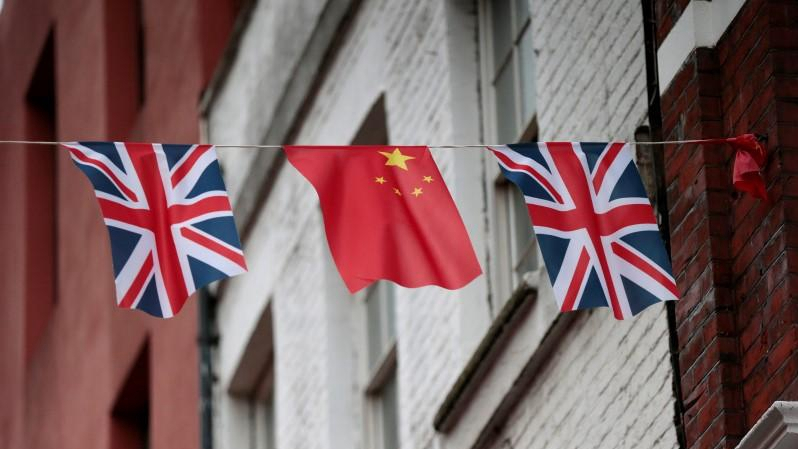Richard Bush, former chairman of the American Institute in Taiwan
by Dave Chamberlain, Staff Writer
Richard Bush, former chairman of the American Institute in Taiwan and non-resident senior fellow at the Brookings Institution, a Washington think tank, highlighted China’s military threats and non-military coercion against Taiwan are challenges to the security partnership between the United States and Taiwan, as well as challenges to the United States in East Asia. The next U.S. president must respond carefully.
The United States will hold a presidential election on November 5. Vice President Kamala Harris, representing the Democratic Party, will face off against Republican opponent Trump, who was the former president (2017-2021).
Bush wrote that the United States and Taiwan have a security partnership, which is both broad and deep and complex. The next government must handle it carefully in the context of the relationship between Beijing and Washington and Taipei.
He said that China uses military threats and non-military coercion to achieve the political goal of reunifying Taiwan, which poses a serious challenge to Taiwan’s security and the US-Taiwan partnership. It requires the determination and military power of Taiwan’s leaders and people to intimidate. At the same time, the United States’ commitment to Taiwan’s security is also critical.
Bush explores the impact of Taiwan’s vulnerability on the U.S.-Taiwan security partnership from seven aspects, including whether Taiwan has invested enough resources to deter war.
He mentioned that Washington has long urged that Taiwan’s military budget should account for an appropriate proportion to deal with military threats. However, Taiwan’s defense budget only increased from 11% to 12% in the 10 years from 2013 to 2022. In comparison, the proportion of education plus social welfare in 2022 will account for 45.6% of the total annual expenditure.
He said that during this period, Taiwan’s total defense budget expenditure increased by 50.2%, about 5% per year, most of which was used to purchase expensive weapons from the United States and support volunteer military forces. Taiwan’s military strength is only 188,000, less than 1% of the population. Establishing more reserves of food, oil, ammunition, spare parts, etc. will strengthen Taiwan’s long-lasting defense capabilities.
Bush also analyzed from a policy perspective how the United States and Taiwan can adjust their policies to reduce the risk that Chinese leaders believe war is the only option. He said that the key is that any Taiwan government, especially the Democratic Progressive Party government, must show that it has no intention to pursue legal independence. This is not easy because Beijing sometimes misunderstands Taiwan’s intentions and political dynamics.
He said that Tsai Ing-wen’s approach during her term of office of not yielding to Chinese pressure or making rash advances because of U.S. support is worth emulating. There are three factors that may encourage the current Lai Ching-te administration to exercise restraint: first, to prioritize domestic affairs; second, to let the public understand that if Taiwan’s provocation causes the People’s Liberation Army to attack Taiwan, the United States is unlikely to help defend Taiwan; third, the United States and Taiwan Mutual trust and good communication facilitate prudent policy coordination.
As for whether the United States needs to make a public commitment to help defend Taiwan in order to further deter China? Bush said that it might not be necessary. Whether the United States will intervene in the Taiwan Strait conflict is related to how the conflict will occur, which cannot be known in advance. Public statements are not the only way for Washington to express its determination to deter. This message can be clearly conveyed through private high-level meetings.
Regarding U.S.-China-Taiwan relations after the U.S. election, Bush said that China will definitely continue its non-military coercion against Taiwan and will continue to make moves in East Asia to test the U.S. response.
He said that if Harris is elected, she may continue the policies of US President Joe Biden, including communicating closely with Taiwan, providing Taiwan with material and psychological support, and urging China to show restraint. If Trump is elected, his administration may be as chaotic, contradictory, and inconsistent as his first term.
前美國在台協會理事主席卜睿哲於16日發表文章,指出中國對台灣的軍事威脅及非軍事脅迫,對美國與台灣的安全夥伴關係構成挑戰,同時也是美國在東亞面臨的挑戰,未來的美國總統需謹慎應對。
卜睿哲,現任華府智庫「布魯金斯研究所」的資深研究員,在該智庫發表的文章中,探討了美國與台灣安全夥伴關係的重要性。美國將於11月5日舉行總統選舉,副總統賀錦麗代表民主黨,與曾任總統的共和黨候選人川普對決。
他指出,美國與台灣的安全夥伴關係既廣泛又深厚,且相當複雜,下一任政府必須在北京與華府及台北的關係背景下謹慎處理。卜睿哲強調,中國透過軍事威脅和非軍事脅迫,試圖實現統一台灣的政治目標,這對台灣的安全及美台夥伴關係構成了嚴重挑戰,台灣的領導者和民眾必須展現決心,並加強軍事力量的威懾,同時美國對台灣安全的承諾也至關重要。
他從七個方面分析了台灣的脆弱性對美台安全夥伴關係的影響,包括台灣是否投入足夠資源以威懾戰爭。他提到,華府長期以來一直督促台灣的軍事預算應占適當比例,以應對軍事威脅。然而,台灣的國防預算在2013年至2022年間,僅從政府總支出的11%提高到12%。相比之下,2022年教育和社會福利的支出比例達到45.6%。
卜睿哲指出,這段期間台灣國防預算的總支出增長了50.2%,每年約5%,大部分用於向美國購買昂貴的武器和支持志願役軍力。台灣的軍隊編制僅有18.8萬人,不到總人口的1%。他建議,建立更多的糧食、石油、彈藥和備件儲備,將有助於增強台灣的持久防禦能力。
在政策層面上,卜睿哲分析了美台如何調整政策,以降低中國領導人認為戰爭是唯一選項的風險。他指出,任何台灣政府,尤其是民進黨政府,必須表明不追求法理獨立的意圖,這並不容易,因為北京有時會誤解台灣的意圖和政治動態。
他提到,蔡英文在任內採取不屈服於中國壓力的立場,並未因美國的支持而冒進,這一做法值得借鑒。當前的賴清德政府應保持克制,主要有三個因素:首先,將內政作為施政優先;其次,讓民眾明白若台灣挑釁導致解放軍攻台,美國不太可能協防;第三,美台之間的互信與良好溝通有助於謹慎的政策協調。
關於美國是否需要公開承諾協防台灣以增強對中國的威懾,卜睿哲表示,這可能並非必要。美國是否會介入台海衝突取決於衝突的具體情況,事前無法預測。公開聲明並不是華府表達威懾意圖的唯一途徑,透過不公開的高層會議也能有效傳遞這一信息。
談及美國大選後的美中台關係,卜睿哲指出,中國將繼續對台灣施加非軍事的壓力,並在東亞地區積極行動,以測試美國的反應。
他提到,如果賀錦麗當選,她可能會延續拜登總統的政策,包括與台灣保持密切溝通、提供實質和心理上的支持,以及敦促中國保持克制。若川普再次當選,其政府可能會重現第一任期時的混亂、矛盾和不一致的言辭。



